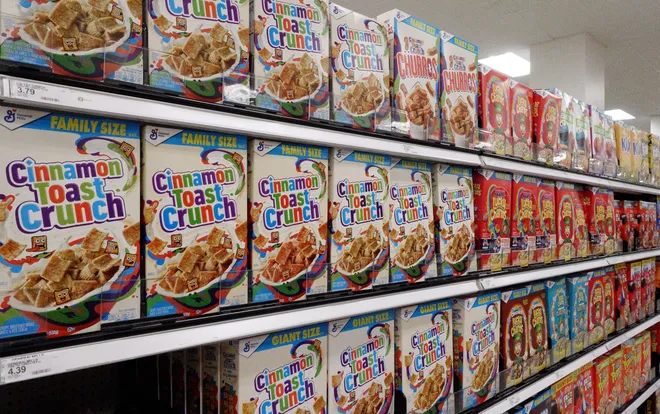'Shrinkflation' in Pepsi, Coke, General Mills products targeted by Democrats
Two members of Congress are calling out Coca-Cola, PepsiCo and General Mills over shrinkflation – reducing the size of their products, but not the prices – and price-gouging consumers while avoiding corporate taxes.
In letters dated Oct. 6 and sent to the CEOs of those three companies, Sen. Elizabeth Warren, D-Mass., and Rep. Madeleine Dean, D-Pa., wrote they were concerned about the "pattern of profiteering off consumers, both through 'shrinkflation,' and dodging taxes on those price-gouging profits."
The congresswomen cited several examples including PepsiCo's replacement of 32-ounce Gatorade bottles with 28-ounce bottles, but charging the same price, essentially "a 14% price increase," they wrote. General Mills reduced some Family Size cereals from 19.3 ounces to 18.1 ounces, while charging the same price, then raising prices five times from mid-2021-mid-2022, they charged. Coca-Cola, they said, used "package innovation" to sell "less soda for the same price."

Spirit Christmas stores?:One could be opening near you as Spirit Halloween plans to expand with 10 Christmas locations.
Congresswomen: Companies shrunk products, avoided taxes
As the companies used shrinkflation tactics from 2018 to 2022, each had billions in profits, Warren and Dean charged, but paid average effective tax rates of 15% or less – lower than the corporate tax rate of 21%, set by the 2017 tax cuts, passed during President Trump's term in office.
As each company "continues to profit off consumers," the congresswomen wrote, each "is also turning around and paying less of those profits in taxes than the families it price gouges."
The companies did not respond to request for comment from USA TODAY.
What is shrinkflation? Why is it on the rise?
Shrinkflation, reducing the size of a product's packaging but keeping the price the same, is not a new concept. Recent Labor Department data found shrinkflation is more common now than during the COVID-19 pandemic years. However, it was also common prior to the pandemic, the data shows.
But the issue has become a hot one as consumers have become highly price-sensitive over the past year. That's led companies to be more likely to reduce the size or volume of a product rather than hike the price.
It's become a campaign issue for Vice President Kamala Harris who has called for a federal ban on price-gouging. That follows President Joe Biden's criticism of food producers for "shrinkflation" during a Super Bowl ad and in his State of the Union address in March 2024. He urged the passage of the Shrinkflation Prevention Act of 2024 a bill from Sen. Bob Casey, D-Pa.
The two congresswomen asked each company for pricing information of products (by ounces) over the past seven years, along with what the companies' federal tax would have been had the 2017 tax reform act not passed. They also asked whether executives got bonuses or other incentives during periods of high inflation.
Corporate practices – shrinkflation and low effective tax rates – can "have the effect of squeezing consumers two times over," they wrote.
In the letters, Warren and Dean cite the report “Corporate Tax Avoidance in the First Five Years of the Trump Tax Law,” from the left-leaning Institute of Taxation and Economic Policy, which found 342 large corporations had paid a cumulative effective tax rate of 14.1% over five years.
Contributing: Paul Davidson, Rachel Looker and Rebecca Morin.
Follow Mike Snider on X and Threads: @mikesnider & mikegsnider.
What's everyone talking about? Sign up for our trending newsletter to get the latest news of the day
Disclaimer: The copyright of this article belongs to the original author. Reposting this article is solely for the purpose of information dissemination and does not constitute any investment advice. If there is any infringement, please contact us immediately. We will make corrections or deletions as necessary. Thank you.







